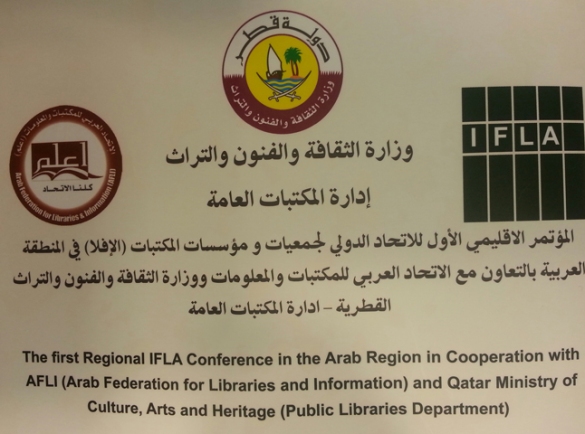Qatar hosted the First Regional International Federation of Library Associations (IFLA) Conference in the Arab region on the 10th and 11th of June 2013. It was organized in cooperation with the Arab Federation for Libraries and Information (AFLI) and the Public Libraries Department of Qatar Ministry of Culture, Arts, and Heritage. The conference examined the role of national libraries and associations in supporting free access to information according to the copyright laws. Both Jennifer Nicholson (IFLA General Secretary) and Professor Hassan Alsereihy (AFLI president), attended the two-day event that consisted of more than 15 talks.
Reflections from the first regional IFLA/AFLI conference:
From a legal point view, Dr. Sulaiman AlReyaee (Al Jouf University, Saudi Arabia) presented his study, which examined Arabic copyright agreements and the application of international copyright laws in a non-Western culture. He concluded that development and enforcement of copyright law is highly dependent on the way Arab states will develop their respective constitutions with regards to common laws, civil laws, or Islamic laws.
Dr. Claudia Lux (Qatar National Library, Qatar) gave an overview of current Qatar copyright law, the Emiri Decree-Law No. 7 from 2002 on the Protection of Copyright and related rights. She compared current copyright law in Qatar with IFLA’s twelve recommendations for better copyright laws that were published in 2009. The copyright term in Qatari law is consistent with the Berne Convention and includes various provisions relating to EFLA’s recommendations such as provisions for preservation, copyright exemptions in teaching and reproduction for private use. Dr. Lux stated that even though the current Qatari copyright law protects authors and publishers, the law requires further additions as exceptions for education and teaching are more advanced than exceptions for library use. Currently, there are no general free use exceptions for libraries, which are limited to reprographic reproduction. Moreover, Dr. Lux acknowledged that current Qatari copyright law requires further developments with respect to copyright of orphan works and provisions for persons with disabilities. Finally, she recommended that librarians in Qatar need to be trained in Qatar’s copyright law and more importantly need to educate their clients.
Whereas the majority of sessions in the conference’s first day dealt with copyright issues digital content protection in libraries based in the Arab world, sessions on the second day (and to my delight) had a focus on open access.
Dr. Nozha ibn Al Khayat (Rabat University, Morocco) gave a presentation on copyright law protection and open access in the Arab world. She explained that even though initiatives in Saudi Arabia, Egypt, and Tunisia have established open access repositories, a large proportion of academics based in Arab countries do not have a clear understanding of open access. Dr. Ibn Al Khayat acknowledged the need for more institutional repositories and called out for developments by regional governments to include copyright provisions relating to open access.
Likewise, Dr. Jibreel Al-Arishee (King Saud University, Saudi Arabia) spoke about the need for more institutional repositories. His presentation focused on the roles of Arab governmental agencies and legislative councils in the adoption of open access. He called for the adoption of regional public access policies for all research financed by governmental funds.
Listening to the likes of Dr. Ibn Al Khayat and Dr. Al-Arishee speak about open access and sensing their passionate advocacy resonating in the Nashira Ballroom, I left the Doha Hilton that day feeling reassured. With his current role in the in Consultative Assembly of Saudi Arabia (Majlis as-Shura or Shura Council), Dr. Al-Arishee gave a pan-Arab glimmer of open access hope as he announced that he is working on a public access policy adoption in Saudi Arabia.
Realistically, an adoption of a public access policy, or even open access, in the Arab world will take some time. However, after witnessing a strong advocacy in this conference, I am hopeful that change will happen.


